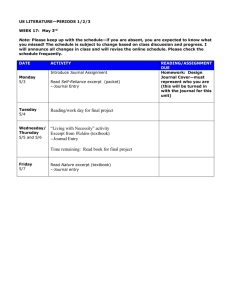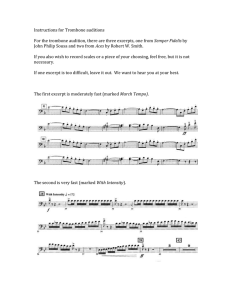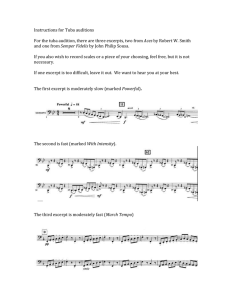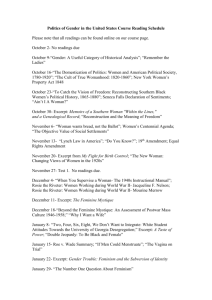Office: 2240 Piedmont Avenue Phone: 642-0493 Email:
advertisement
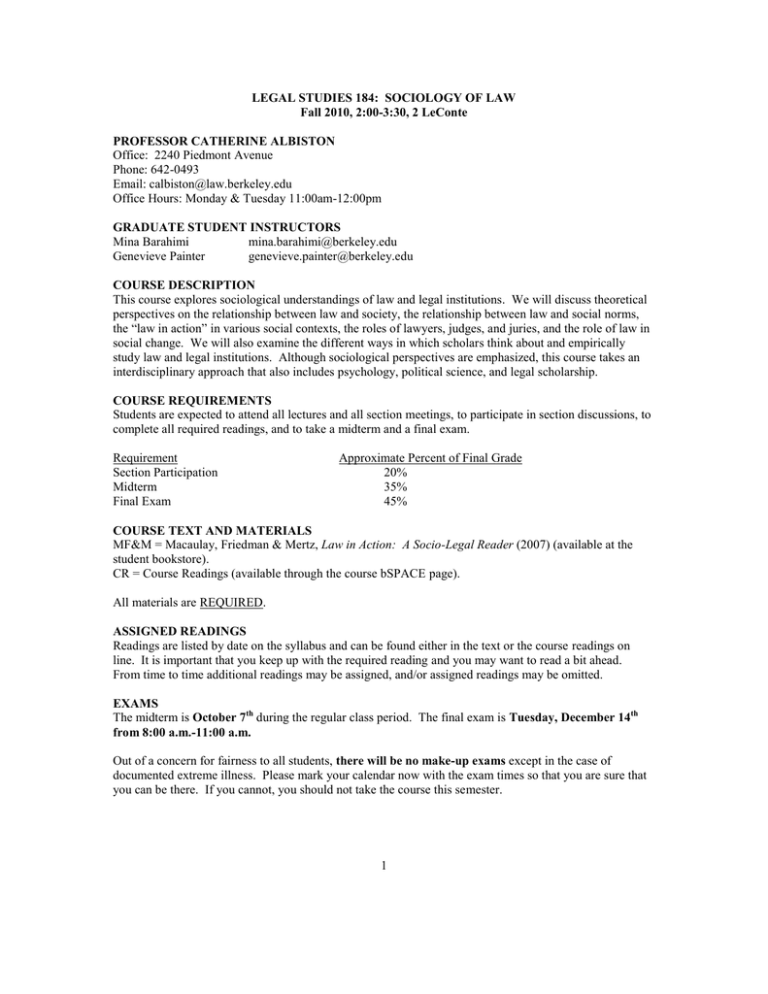
LEGAL STUDIES 184: SOCIOLOGY OF LAW Fall 2010, 2:00-3:30, 2 LeConte PROFESSOR CATHERINE ALBISTON Office: 2240 Piedmont Avenue Phone: 642-0493 Email: calbiston@law.berkeley.edu Office Hours: Monday & Tuesday 11:00am-12:00pm GRADUATE STUDENT INSTRUCTORS Mina Barahimi mina.barahimi@berkeley.edu Genevieve Painter genevieve.painter@berkeley.edu COURSE DESCRIPTION This course explores sociological understandings of law and legal institutions. We will discuss theoretical perspectives on the relationship between law and society, the relationship between law and social norms, the “law in action” in various social contexts, the roles of lawyers, judges, and juries, and the role of law in social change. We will also examine the different ways in which scholars think about and empirically study law and legal institutions. Although sociological perspectives are emphasized, this course takes an interdisciplinary approach that also includes psychology, political science, and legal scholarship. COURSE REQUIREMENTS Students are expected to attend all lectures and all section meetings, to participate in section discussions, to complete all required readings, and to take a midterm and a final exam. Requirement Section Participation Midterm Final Exam Approximate Percent of Final Grade 20% 35% 45% COURSE TEXT AND MATERIALS MF&M = Macaulay, Friedman & Mertz, Law in Action: A Socio-Legal Reader (2007) (available at the student bookstore). CR = Course Readings (available through the course bSPACE page). All materials are REQUIRED. ASSIGNED READINGS Readings are listed by date on the syllabus and can be found either in the text or the course readings on line. It is important that you keep up with the required reading and you may want to read a bit ahead. From time to time additional readings may be assigned, and/or assigned readings may be omitted. EXAMS The midterm is October 7th during the regular class period. The final exam is Tuesday, December 14th from 8:00 a.m.-11:00 a.m. Out of a concern for fairness to all students, there will be no make-up exams except in the case of documented extreme illness. Please mark your calendar now with the exam times so that you are sure that you can be there. If you cannot, you should not take the course this semester. 1 Exams will consist of some combination of short answer, multiple choice, and essay questions. The midterm exam will cover Units I and II. The final exam will focus on Units III, IV and V, but may also include concepts from Units I and II. All exams will begin promptly at the beginning of the class or exam period, and will end at the end of the class or exam period. Students who arrive late must still turn their exams in at the end of the class or exam period. Exams will be closed book and closed notes. Although this should be obvious, it bears stating explicitly: cheating on exams will result in a failing grade for the course. ATTENDANCE: Attendance is required in the sense that exams will be based on both lecture and assigned reading materials. You are responsible for all lecture materials and for any announcements made in class, whether or not you are present. Also, there will be no additional screenings of the videos presented throughout the semester. If you miss class on one of these days you should ask a classmate to review their notes from that day. You are required to attend section meetings; 20% of your grade is based on section attendance and participation. If you must miss class for a prolonged period due to serious illness, you should speak to your GSI or to me as soon as possible. OFFICE HOURS My office hours are Monday and Tuesday from 11am-12pm. Sign-up sheets are posted outside my office; you are welcome to drop in during open time slots if there are any. You should contact your GSI first with questions about course logistics, but feel free to come by during my office hours to discuss course materials or questions, career questions, or anything else. I would prefer that you not drop by my office except during office hours; if you cannot come to my regular office hours please make an appointment. TARDINESS: Please do not arrive late to class as it is disruptive both to me and to your classmates. Repeated tardiness will result in a lower grade. CELL PHONES: Please turn off cell phones during lecture and section meetings; this includes text messaging. In addition, cell phones may not be used in any way during exams, including as a watch or time keeper – plan ahead. Failure to comply with this policy will result in a lower grade. DISABILITY ACCOMMODATIONS: If you have a disability that may require accommodations please speak to your GSI early in the semester (i.e. in the first two weeks) to make arrangements. 2 UNIT I: WEEK 1 August 26 WEEK 2 August 31 September 2 THEORETICAL FOUNDATIONS OF THE SOCIOLOGY OF LAW Introduction MF&M, Chapter 1, pp. 1-18. A Brief History of Legal Thought: Natural Law, Legal Formalism, and Legal Realism Treviño, A. Javier (1996) “Chapter 3: The Sociological Movement in Law,” pp. 55-75 in The Sociology of Law [in CR]. Cultural Models Kidder, Robert L. (1983) “The Origins of Law: Custom,” Chapter 3 in Connecting Law and Society, pp. 36-57 [in CR]. Bohannon, Paul (1973), “The Differing Realms of Law,” in Black & Meleski (eds.) The Social Organization of Law. New York: Seminar Press, pp. 306-316 [in CR]. David E. Rosenbaum, “Legal License: Race, Sex, and Forbidden Unions,” NY Times, December 14, 2003 [in CR]. WEEK 3 September 7 Structural Models Kidder (1983), “The Origins of Law: Structure,” Chapter 4 in Connecting Law and Society, pp. 58-82 [in CR]. Schwartz, Richard (1954), “Social Factors in the Development of Legal Control: A Case Study of Two Israeli Settlements,” Yale Law Journal, 63:471-491 [excerpt and notes in CR]. September 9 Conflict Models Kidder (1983), “The Origins of Law: Conflict, the Critical Perspective,” Chapter 5 in Connecting Law and Society, Chapter 5, pp. 83-110 [in CR]. Chambliss, W. J. (1964), “A Sociological Analysis of the Law of Vagrancy,” Social Problems, 12: 67-77, excerpt from Treviño, A.J. (1996), The Sociology of Law, pp. 373380 [in CR]. Hunt, Alan (1993), “Critical Legal Theory and Marxism,” “Legitimation and Legal Ideology,” pp. 145-150 in Explorations in Law and Society: Toward a Constitutive Theory of Law, New York: Routledge [in CR]. Cotterrell, Roger (1992), “Law and Ideology” “Legal Individualism,” “Law in Corporate Society,” pp. 114-127 in The Sociology of Law: An Introduction, 2 nded. London: Butterworths [in CR]. Gabel, Peter & Jay Feinman (1998), “Contract Law as Ideology,” pp. 497-510 in D. Kairys (ed.) The Politics of Law: A Progressive Critique. New York: Pantheon [in CR]. 3 WEEK 4 September 14 Other Theoretical Frameworks in Law & Society Scholarship Kidder, Robert L. (1983), “Legal Impact: Does Law Make Any Difference?” Chapter 6 in Connecting Law and Society, pp. 112-146 [in CR]. Sarat, Austin & Thomas R. Kearns (1993), “Beyond the Great Divide: Forms of Legal Scholarship and Everyday Life,” pp. 21-32 in A. Sarat & T.R. Kearns (eds.) Law in Everyday Life. Ann Arbor, MI: University of Michigan Press [excerpt in CR]. UNIT II: MICROFOUNDATIONS OF LEGAL BEHAVIOR September 16 Rationality and Legal Sanctions M,F&M, Chapter 4: Introduction, pp. 367-369. Gibbs, Jack (1986), “Deterrence Theory and Research,” in G. Melton (ed.) The Law as a Behavioral Instrument. Lincoln, NB: University of Nebraska Press [excerpt and notes in MF&M: 369-371]. Antunes, George and A. Lee Hunt (1973), “The Deterrent Impact of Criminal Sanctions: Some Implications for Criminal Justice Policy,” 51 Journal of Urban Law 145, excerpted in L. Friedman and S. Macaulay (eds.), Law and the Behavioral Sciences New York: Bobbs-Merrill Co., pp. 277-291 [in CR]. Friedman, Lawrence (1975), “The Deterrence Curve,” in The Legal System: A Social Science Perspective. New York, NY: Russell Sage [excerpt and notes in MF&M: 397401]. Grasmick, Harold G. and Robert J. Bursik, Jr. (1990), “Conscience, Significant Others, and Rational Choice: Extending the Deterrence Model,” Law & Society Review, 24:837861 [excerpt and notes MF&M: 418-421]. Steve Stecklow, “Helsinki on Wheels: Fast Finns Find Fines Fit Their Finances,” Wall Street Journal,” January 2, 2001 [in CR]. 4 WEEK 5 September 21 Normative Decision Making and Morality Tyler, Tom, “Public Mistrust of the Law: A Political Perspective,” Univ. of Cincinnati Law Review 66:847 (1998), SECTION IV ONLY [MF&M: 472-474]. Berkowitz, Leonard and Nigel Walker (1967), "Laws and Moral Judgements," Sociometry 30:410, excerpted in L. Friedman and S. Macaulay (eds.), Law and the Behavioral Sciences New York: Bobbs-Merrill Co., pp. 195-212 [in CR]. Tittle, Charles and Alan Rowe (1983), “Moral Appeal, Sanction Threat, and Deviance: An Experimental Test,” Social Problems 20:488 [excerpt & notes MF&M: 422-431]. Phil Kloer, “Questions of Law and Morality Sharpen as Tens of Millions Continue to Download Music,” Atlanta Journal and Constitution, December 22, 2002 [in CR]. Amy Harmon & John Schwartz, “Despite Suits, Music File Sharers Shrug Off Guilt and Keep Sharing,” New York Times, September 19, 2003 [in CR]. Schultz, Mark F., “Fear and Norms and Rock & Roll: What Jambands Can Teach Us about Persuading People to Obey Copyright Law,” Berkeley Technological Law Journal 21: 651 (2006) [excerpt & notes MF&M: 431-466]. September 23 Cognitive Decision Making Scott, W. Richard (1995), "Contemporary Institutional Theory," in Institutions and Organizations. Thousand Oaks, CA: Sage, pp. 33-45, 49-52 [in CR]. Berger, Peter & Thomas Luckman (1966), The Social Construction of Reality: A Treatise on the Sociology of Knowledge pp. 53-55 [in CR]. Lawrence Weschler, “Laughing All the Way to the Bank,” The Guardian (London), May 8, 1999, page 1 [in CR]. Wes Smith, “Drawing Interest: Don‟t Take a Boggs Bill at Face Value,” Chicago Tribune, October 18, 1988, Tempo Section page 1 [in CR]. Robert Dalton, “What Was Revolutionary about the French Revolution?”, New York Review of Books, January 19, 1989 [in CR]. VIDEO - Money Man WEEK 6 September 28 Social Responses to Crime and the Construction of Deviance Lauderdale, Pat (1976), “Deviance and Moral Boundaries,” Am. Soc. Rev. 41:660-676 [in CR]. Gusfield, Joseph (1967), “Moral Passage: The Symbolic Process in Public Designations of Deviance,” Social Problems 15:175-188 [excerpt & notes in MF&M: 528-541]. 5 September 30 Legitimacy and Authority Tyler, Tom R. and E. Allan Lind (1988), "Procedural Justice in Law I," "Procedural Justice in Law II," "Implications of the Procedural Justice Literature," in The Social Psychology of Procedural Justice, pp. 61-83, 93-112, 217-220 [in CR]. Milgram, Stanley (1978), Obedience to Authority: An Experimental View [excerpt and notes in MF&M:508-515]. WEEK 7 October 5 Mid-term Review October 7 MIDTERM EXAM UNIT III: LAW IN ACTION – DISPUTE RESOLUTION & LAW IN CONTEXT WEEK 8 October 12 Legal Mobilization: Disputes as Social Constructs Felstiner, William, Richard Abel, and Austin Sarat (1981), “The Emergence and Transformation of Disputes: Naming, Blaming, and Claiming...,” Law and Society Review 15: 631-654 [in CR]. Bumiller, Kristin (1986), "Victims in the Shadow of the Law: A Critique of the Model of Legal Protection," Signs, 12:3-16 [in CR]. Albiston, Catherine (1999), “Bargaining in the Shadow of Social Institutions: Competing Discourses and Social Change in Workplace Mobilization of Civil Rights,” Law & Society Review 39: 11 [introduction, excerpt & notes M,F&M: 541-565]. October 14 Power in Civil Dispute Resolution Galanter, Marc (1974), “Why the „Haves‟ Come Out Ahead: Speculation on the Limits of Legal Change,” Law and Society Review 9: 95-160 [in CR]. VIDEO -- Justice for Sale WEEK 9 October 19 Criminal Dispute Resolution Blumberg, Abraham (1967), “The Practice of Law as Confidence Game: Organizational Cooptation of a Profession,” Law and Society Review 1:15-39 [excerpt and notes in CR]. Leo, Richard (1996), “Miranda‟s Revenge: Police Interrogation as a Confidence Game,” Law & Society Review 30: 259 [excerpt and notes in MF&M: 58-75]. Lisa Frohman (1997), “Convictability and Discordant Locales: Reproducing Race, Class, and Gender Ideologies in Prosecutorial Decisionmaking.” 31 Law & Society Review 531 (1997) [in CR]. 6 October 21 Civil Dispute Resolution and Alternative Norms Mnookin, Robert & Lewis Kornhauser (1979), “Bargaining in the Shadow of the Law: The Case of Divorce,” Yale Law Journal 88:950-997 [excerpt & notes in CR]. Erlanger, Howard, Elizabeth Chambliss & Marygold S. Melli (1987), “Participation and Flexibility in Informal Processes: Cautions from the Divorce Context,” Law and Society Review 21:585-604 [excerpt and notes in CR]. Macaulay, Stewart (1963), “Non-contractual Relations in Business: A Preliminary Study,” American Sociological Review 28:55-68 [excerpt and notes MF&M: 75-92]. WEEK 10 October 26 October 28 Organizational Responses to Law Edelman, Lauren (1992). “Legal Ambiguity and Symbolic Structures: Organizational Mediation of Civil Rights Law,” American Journal of Sociology 97:1531-1576, excerpted in P. Burstein (ed.) (1994) Equal Employment Opportunity: Labor Market Discrimination and Public Policy, pp. 247-260 [in CR]. Alternative Dispute Resolution Bryan, Penelope E. (1992), “Killing Us Softly: Divorce Mediation and the Politics of Power,” Buffalo Law Review 40: 441 [excerpt in CR]. Edelman, Lauren, Howard S. Erlanger, and John Lande (1993), “Internal Dispute Resolution: The Transformation of Civil Rights in the Workplace,” Law and Society Review 27:497-534 [in CR]. UNIT IV: WEEK 11 November 2 INSTITUTIONAL ACTORS – LAWYERS, COURTS & JURIES Institutional Actors I: Lawyers Robert Nelson, “The Futures of American Lawyers: A Changing Profession in A Changing Society,” 44 Case Western Reserve Law Review 345 (1994) [excerpt from Lawyers: A Critical Reader, R. Abel, ed. (1997) in CR]. Heinz, John P., and Edward O. Laumann, Chicago Lawyers: The Social Structure of the Bar. New York: Russell Sage Foundation (1994) [excerpt from Lawyers: A Critical Reader, R. Abel, ed. (1997) in CR]. . Reichman, Nancy & Joyce S. Sterling (2004), Gender Penalties Revisited [excerpt & notes MF&M: pp. 827-857]. 7 November 4 Institutional Actors II: Courts Introduction to section on judges, MF&M: 729-731. Goldman, Sheldon et al. (2005), “W. Bush‟s Judiciary: The First Term Record,” Judicature 88:244 [excerpt and notes MF&M: 731-752]. Epstein, Lee and Jack Knight, “Courts and Judges”, in The Blackwell Companion to Law and Society (A. Sarat, ed. 2004), pp. 170-194 [in CR]. Posner, Richard, “What Am I? A Potted Plant?,” The New Republic, September 18, 1987 [excerpt & notes MF&M: 777-789]. WEEK 12 November 9 Institutional Actors III: Juries Neil Vidmar & Valerie Hans (2007), American Juries: The Verdict, Chapters 6 & 11 [in CR]. Burnett, D. Graham, “Anatomy of a Verdict: The View from a Juror‟s Chair,” The New York Times Magazine, August 26, 2001, Section 6, page 32 [in CR]. McCann, Michael, William Haltom, & Anne Bloom (2001), “Java Jive: Genealogy of Juridical Icon,” Univ. of Miami Law Review 56: 113 [excerpt and notes MF&M: 216251]. VIDEO – Inside the Jury Room November 11 UNIVERSITY HOLIDAY – NO CLASS UNIT V: WEEK 13 November 16 LAW AND SOCIAL CHANGE Law as a Dependent Variable v. Law as an Independent Variable Friedman & Ladinsky, “Social Change and the Law of Industrial Accidents,” [excerpt & notes in MF&M: 195-213]. Zemans, Frances Kahn (1983), ALegal Mobilization: The Neglected Role of Law in the Political System,@ American Political Science Review 77:690-703 [in CR]. November 18 Can Law Change Society? Courts as Institutions of Social Change Rosenberg, Gerald (1993), The Hollow Hope. Chicago: University of Chicago Press. [excerpt and notes in CR]. VIDEO – The Road to Brown WEEK 14 November 23 November 25 The Rights Debate: Evaluating the Role of Law in Social Change Galanter, Marc (1983), "The Radiating Effects of Courts," in K. Boyum and L. Mather Empirical Theories about Courts. New York: Longman. pp. 117-142 [in CR]. THANKSGIVING HOLIDAY – NO CLASS 8 WEEK 15 November 30 Law, Social Movements, and Social Change McCann, Michael, “Law and Social Movements,” in The Blackwell Companion to Law and Society (A. Sarat, ed. 2004), pp 506-522 [in CR]. Barkan, Steven E. 1980. "Political Trials and Resource Mobilization: Towards an Understanding of Social Movement Litigation." Social Forces 58:944-961 [in CR]. Barkan, Steven. 1984. "Legal Control of the Southern Civil Rights Movement." American Sociological Review 49:552-565 [in CR]. December 2 Legal Consciousness, Micro-resistance, and Law in Everyday Life Ewick, Patricia, and Susan Silbey. 2003. "Narrating Social Structure: Stories of Resistance to Legal Authority." American Journal of Sociology 108:1328-72 [in CR]. Engel, David. M. and Frank Munger (1996), “Rights, Remembrance, and the Reconciliation of Difference,” Law and Society Review 30:7-53 [in CR]. WEEK 16 December 7 Conclusion December 9 Final Exam Review FINAL EXAM is Tuesday, December 14th from 8-11 a.m. 9
